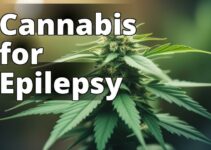What you will learn about Delta-8 THC vs CBD:
- Definition and explanation of Delta-8 THC and CBD
- Differences in effects and potential benefits
- Safety concerns and legal status
- Potential medical uses and interaction with the endocannabinoid system
- Dosage guidelines and personal experiences
What is Delta-8 THC?
When discussing the differences between delta-8 THC and CBD, it's important to first understand what each compound is and how they are derived. Delta-8 THC, also known as delta-8 tetrahydrocannabinol, is a cannabinoid that is found in the cannabis plant. It is considered to be a less potent version of the more well-known delta-9 THC, which is responsible for the psychoactive effects commonly associated with marijuana. Delta-8 THC and delta-9 THC have the same empirical formula, but differ slightly in their chemical structure.
Delta-8 THC is not naturally abundant in the cannabis plant, especially in hemp plants. Instead, it is typically derived from cannabidiol (CBD) or delta-9 THC through a process that involves the use of industrial chemicals. This conversion process raises some safety concerns, as it may result in the presence of unknown compounds or impurities in delta-8 THC products. It is important to note that delta-8 THC is not well-regulated, and the lack of oversight in the industry further emphasizes the need for caution when considering the use of these products.
One of the key distinctions between delta-8 THC and delta-9 THC is their psychoactive properties. Delta-8 THC is known to produce milder effects compared to delta-9 THC, meaning that it may offer some of the benefits associated with THC without the same level of intensity. Users of delta-8 THC often report feelings of euphoria, relaxation, and potential pain relief. However, it is crucial to mention that delta-8 THC can still cause a “high” and may result in a positive THC drug test.
Reference: Healthline – What Is Delta-8?
What is CBD?
CBD, short for cannabidiol, is another cannabinoid found in the cannabis plant. Unlike delta-8 THC, CBD is non-intoxicating, which means it does not produce a “high” or psychoactive effects. CBD has gained significant popularity in recent years due to its potential therapeutic uses and wide range of applications. It interacts with the body's endocannabinoid system, which is responsible for regulating various physiological processes such as pain perception, mood, and immune function.
CBD is often extracted from hemp plants, which contain high levels of CBD and minimal levels of THC. This makes CBD products legally available in many parts of the world, as they comply with the legal limit of THC content. It is worth noting that CBD can also be derived from marijuana plants, which contain higher levels of THC.
The potential uses of CBD are extensive and varied. It has been studied for its potential in managing chronic pain, reducing anxiety and stress, alleviating symptoms of epilepsy, and even supporting mental health conditions such as depression and insomnia. CBD interacts with various receptors in the body, including serotonin receptors, which are involved in regulating mood and anxiety.
Reference: Leafwell – Delta 8 vs. CBD
Effects and Benefits
Understanding the effects and benefits of delta-8 THC and CBD is crucial for individuals considering the use of these compounds. While both delta-8 THC and CBD have the potential to offer therapeutic benefits, they differ in their physiological effects and target applications.
Delta-8 THC, as mentioned earlier, is known to produce mild psychoactive effects. Users often report feelings of euphoria, relaxation, and potential pain relief. These effects can be beneficial for individuals seeking a sense of calm and relaxation without the intense high associated with delta-9 THC. However, it is important to note that delta-8 THC can also have potential side effects such as red eyes, dry mouth, rapid heart rate, coordination issues, anxiety, and memory loss.
On the other hand, CBD is non-intoxicating and does not produce a high. It is often used for stress and anxiety relief, as it has been found to have a calming effect on the body. CBD has also shown potential in managing chronic pain, reducing inflammation, and supporting overall well-being. It is worth mentioning that CBD does not have the same potential side effects as delta-8 THC and is generally considered safe for use. However, it is always recommended to consult with a healthcare professional before incorporating any new supplement or product into your routine.
Research studies have shown that CBD has potential therapeutic effects in various conditions, such as epilepsy, multiple sclerosis, and Parkinson's disease. However, more research is needed to fully understand the mechanisms of action and long-term effects of CBD in different health conditions.
References:
– Healthline – What Is Delta-8?
– Leafwell – Delta 8 vs. CBD
| Delta-8 THC | CBD | |
|---|---|---|
| Psychoactive | Yes | No |
| Intensity | Milder | Non-intoxicating |
| Reported Effects | Euphoria, relaxation, potential pain relief | Calming, stress relief, potential pain relief, anti-inflammatory |
| Potential Side Effects | Red eyes, dry mouth, rapid heart rate, coordination issues, anxiety, memory loss | Minimal side effects, potential drug interactions |
| Safety Concerns | Unknown compounds, impurities from synthesis process | Potential drug interactions, quality control of products |
| Legal Status | Legal gray area, varies by state | Federally legal if derived from hemp, varies by state |
Personal Experience: Managing Anxiety with CBD
As someone who has struggled with anxiety for most of my adult life, finding an effective solution has been a priority. After doing some research, I came across CBD, a compound derived from the cannabis plant known for its potential stress and anxiety-relieving properties. Intrigued, I decided to give it a try.
I started by incorporating CBD oil into my daily routine. I would take a few drops under my tongue in the morning and before bed. Within a few weeks, I started noticing a difference in my overall mood and anxiety levels. I felt more calm and centered, and the constant feeling of worry began to fade away.
What I appreciate most about CBD is its non-intoxicating nature. Unlike delta-8 THC or delta-9 THC, CBD does not produce a psychoactive effect, meaning it doesn't make me feel high or impaired. This was important to me as I needed something that would help manage my anxiety without interfering with my ability to function throughout the day.
Over time, I have also explored other CBD products such as edibles and topicals. Each method of administration has its own unique benefits and effects, allowing me to customize my CBD experience based on my needs at any given time.
Of course, it's important to note that my experience with CBD may differ from others. Each person's body chemistry and response to CBD can vary, so it's crucial to find the right dosage and method of administration that works best for you. I would highly recommend consulting with a healthcare professional before starting any CBD regimen to ensure it is safe and appropriate for your individual needs.
In my journey to manage anxiety, CBD has been a game-changer. It has provided me with a natural and effective way to alleviate stress and promote a sense of calm in my daily life. While it may not be a one-size-fits-all solution, it is definitely worth considering for those seeking alternative options for anxiety relief.
Safety Concerns
When considering the use of any cannabinoid product, including delta-8 THC and CBD, it is important to be aware of the potential safety concerns associated with these compounds. While CBD is generally considered safe, there are some factors to consider, such as the potential for drug interactions and the quality control of products.
Delta-8 THC, being synthetically produced from CBD using industrial chemicals, raises concerns about the presence of unknown compounds or impurities in the final product. The synthesis process of delta-8 THC often results in impurities and by-products that have not been well-studied or regulated. This lack of oversight and limited testing pose risks to consumers, as the long-term effects of these unknown compounds are still largely unknown.
On the other hand, CBD is generally well-tolerated by most individuals and has a good safety profile. However, it is important to note that CBD may interact with certain medications, particularly those that are metabolized by the liver. Consulting with a healthcare professional before using CBD is recommended, especially if you are currently taking any medications.
It is also important to consider the quality and source of CBD products. The market for CBD is largely unregulated, and there have been instances of mislabeled or contaminated products. It is advisable to purchase CBD products from reputable manufacturers who provide third-party lab testing to ensure product quality and safety.
References:
– Leafwell – Delta 8 vs. CBD
Legal Status
The legal status of delta-8 THC and CBD can vary depending on federal and state laws. It is important to understand the legal implications and regulations surrounding these compounds before purchasing or using them.
Under federal law in the United States, CBD derived from hemp containing less than 0.3% THC is legal. This is due to the passage of the 2018 Farm Bill, which legalized the cultivation and sale of hemp-derived products. Delta-8 THC, being derived from CBD, falls into a legal gray area. While it is not federally legal, it can be sold in some states due to loopholes in the legislation. It is important to note that state laws can differ significantly, and it is essential to be aware of the specific regulations in your jurisdiction.
The legality and availability of CBD products can vary from state to state. Some states have more lenient laws regarding CBD, while others have stricter regulations. It is crucial to research and understand the laws in your specific state or country before purchasing or using CBD products.
References:
– FDA – 5 Things to Know about Delta-8 THC
– Leafwell – Delta 8 vs. CBD
In conclusion, delta-8 THC and CBD are two distinct compounds with different effects and potential benefits. Delta-8 THC offers milder psychoactive effects compared to delta-9 THC, while CBD provides non-intoxicating properties and potential therapeutic uses. It is important to consider the safety concerns, potential side effects, and legal status when considering the use of these compounds. Consulting with a healthcare professional is always recommended before incorporating any new supplement or product into your routine.





